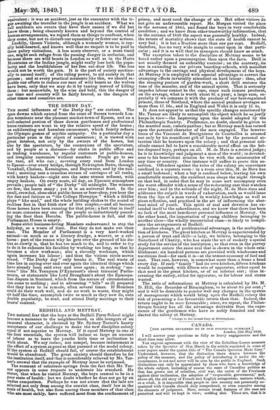THE DERBY DAY.
THE moral influences of "the Derby day" are curious. The open downs which extend from the coast of Sussex towards Lon- don terminate near the pleasant market-town of Epsom, and on a well-selected portion of those downs gentlemen and professional horse-trainers are wont to try the relative speed of the brutes ; an exhilarating and harmless amusement, which faintly reflects the Olympic games of mythic antiquity. On a particular day a particular prize is the object of contention ; it is viewed with great interest, not only by the towners of the horses, but also by the spectators, by the connexions of the spectators, and by people at a distance—by clerks in public office and in trading warehouse, by regular customers at public-houses, and irregular customers without number. People go to see the race, all who can ; covering every road from London to Epsom—over every bridge, through Newington Butts, through Vauxhall, Chelsea, Kensington, and Bayswater, and by the rail- road; morning sees a ceaseless stream of carriages of all ranks, with heavy baskets—night sees the same stream refluent, with empty baskets. On every route, all day, an Epsomic atmosphere prevails ; people talk of" the Derby" till midnight. The winners are few, the losers many ; yet it is an universal feast. In the small, crowded, close-shut public-house or beer-shop, you hear the fun fast and furious as "the College Hornpipe" which a fiddler plays" like mad," and the whole building shakes to the sound of reckless feet in that Irish stew of live couples,—and all because those horses have been running for that prize; a fact that in itself no more concerns any one of the people so industriously pound- ing the floor than Hecuba. The public-house is full, and the Parliament House is empty. Some itrict business-loving Members endeavoured to stop the Isolyday, as a waste of time. But they do not make out their case. The Member of Parliament is a very hard-worked animal—as much so as a literary drudge, a weaver, or a cab- horse : part of the reason why he gets over the ground of his du- ties so slowly is, that he has too much to do, and in order to try to do it he exhausts his faculties by working too long, so that he becomes a slow workman; also a slovenly workman, which again increases his labour ; and thus the vicious circle moves round. "The Derby day" only breaks it. The real waste of time lies in saying over and over again the identical things which have already been said over and over again ; in making "mo- tions" like Mr. Tennyson D'Eyncourt's about triennia(Parlia- ments, or statements like Lord Brougham's about the Episcopa- lian dispute in Scotland, which from the nature of circumstances can come to nothing ; and in advancing " bills" so ill prepared that they have to be remade often several times. If Members could do their work well, and do no work to waste, they might sit half the time, accomplish twice as much as they now do, earn double popularity, be read, and attend Derby meetings to their hearts' content.


























 Previous page
Previous page